Section 3: LITHUANIA TODAY
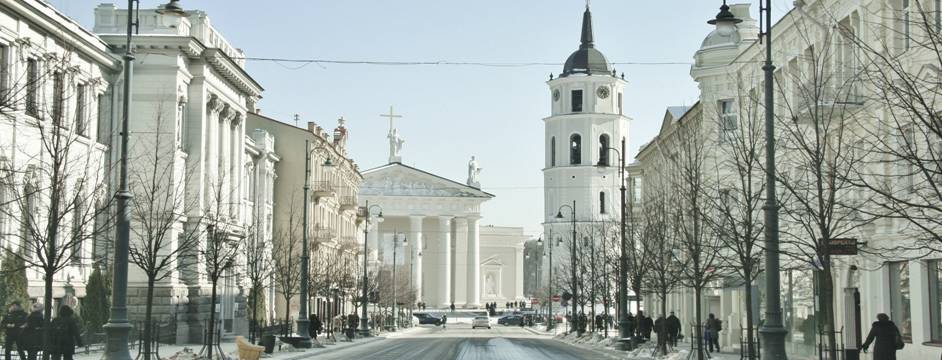

THE VOICE OF INTERNATIONAL LITHUANIA
|
VilNews has its own Google archive! Type a word in the above search box to find any article.
You can also follow us on Facebook. We have two different pages. Click to open and join.
|
Fri, 30th March, 2012 - (1) Comment
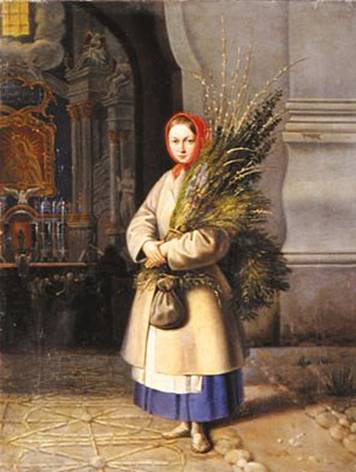
Kanutas Ruseckas (1800–1860).
Lietuvaitė su verbomis (1847)
The Christian world celebrates Jesus' noble entry into Jerusalem on the last Sunday before Easter. In Lithuania this day is called Verbu Sekmadienis – Palm Sunday. When Christianity came to Lithuania, plants which sprouted earliest were honored during spring feasts. Even now, willows, osiers and weeping willows are consecrated on Palm Sunday.
Mythological folklore relates that one of the willows, called Blinde, had been a very fertile woman, bearing numerous children. Earth, the most fertile mother was jealous of her. When Blinde walked through a wetfield, her feet sank into the mud. Blinde turned into a willow tree out of great sadness. The osier, with male spores was regarded as an unusual tree. Folklore tells that the osier grew out of a secretly murdered man. A fife made of osier wood, speaks in a man's voice. Evil spirits avoid it because of its red color. Most palm bunches have a branch of juniper in them. Juniper is green year round, with late ripening berries and with a peculiar odor. All these plants are principal components of palms, however cranberry, mistletoe, filbert and oak branches together with dried baby's breath and ferns are among the odd numbered pieces in the palm. Pussy willows, hepaticas and some indoor plants are added to give color to the palms. When Christianity was established in Lithuania, palms were consecrated in church. The ancient tradition of whipping each other with palms, still exists, takes place on Palm Sunday or on Easter Sunday.
Tue, 20th March, 2012 - (1) Comment
Frankfurter Rundschau:
”Lukaschenko, der gnadenlose Barbar”
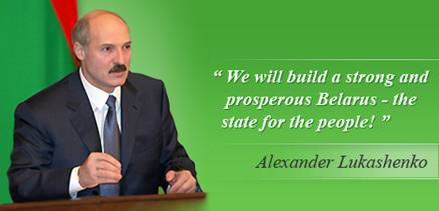
Photo/motto: http://president.gov.by/en/
German newspaper Frankfurter Rundschau calls Belarusian President Alexander Lukashenko a ruthless barbarian after the execution of two young men convicted of a bomb attack at Minsk subway’s most crowded station on April 11, 2011
"The question of whether the guilty of the convicted has been proven is not decisive. The president, who believes that the death of people can be repaid by the death of others, makes a killer of himself. Disregard for human life makes them indistinguishable,” writes the newspaper.
“In addition,” says the newspaper, “the method of the execution in Minsk - a shot in the head - is a symbol of terror in itself. For example, that was the way of killing of thousands of Stalin's victims by monstrous hangman Vasili Blokhin. The memory of this is embodied in the collective consciousness in the former Soviet space deeper than it’s portrayed in the West."

Last November, Dmitry Konovalov and Vladislav Kovalyov were convicted of a bomb attack at Minsk subway’s most crowded station on April 11, 2011, which killed 15 people and wounded hundreds of others. Last Friday they were both executed, shot in their necks.
Tue, 13th March, 2012 - (1) Comment
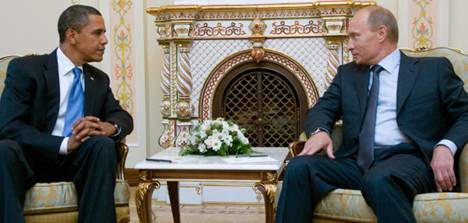
U.S. ties with Russia have been strained since Prime Minister Vladimir Putin began his re-election campaign for president. This has made it more difficult for Washington and Moscow to make progress on policy toward Syria and Iran, and we are in many fields now experiencing that the relatively warm contact between President Obama and President Medvedev is in the process of being replaced by a colder tone. Putin apparently prefers the role of counterweight more than being a world stage partner together with U.S.A.
This month marks three years since the U.S.- Russia “reset” was introduced. In March 2009, Secretary of State Hillary Clinton met with Russian Foreign Minister Sergei Lavrov in Geneva. They agreed that it was time to turn the page in relations between the two countries and start a constructive dialogue with a clean slate.
President Barack Obama has made better relations with Russia a cornerstone of his foreign policy . The so-called “reset” in relations with Russian President Dmitri Medvedev brought about a major arms-control agreement and increased cooperation on such issues as Afghanistan, Iran and Libya.
Analysts say there is currently a chill in relations between Washington and Moscow, not least due to Russia joining China in vetoing a U.N. resolution calling for Syrian president Bashar al-Assad to step aside. Secretary of State Hillary Clinton called the vote “a travesty.”
Georgetown University Russia expert Angela Stent says Vladimir Putin has been employing an old, familiar tool during his recent presidential campaign, blaming the United States for a lot of Russia’s problems..
“He has really resorted to a tactic that, of course, has been used since he became president in 2000 - and that is to invoke the United States [as the] enemy, to blame the United States for a lot of Russian problems," said Stent. "And as you saw, in the Duma elections, he then blamed Hillary Clinton, Secretary Clinton for supporting the opposition and for trying to undermine Russian stability.”
Russia expert Robert Legvold cites another example.
“When the new [U.S.] ambassador, Michael McFaul, hosted opposition figures, even though it was a quiet meeting, the authorities knew about it, had camera people there to film it," said Legvold. "And then that led the media, certainly at Putin’s behest, or media knowing what Putin would want, to sharply attack McFaul for doing this kind of thing, interfering and then accusing the opposition party of, through that channel, receiving funding from the United States.”
Mikhail Leontyev, a commentator on Russian state TV, said McFaul was close to U.S. intelligence services. Others have said McFaul has been sent to Moscow to foment an Orange Revolution in Russia.
The accusation that opposition leaders are working at the behest of the U.S. state department to generate an Orange-style revolution is an insult frequently levelled by Kremlin supporters.
"The thing is that McFaul is not a Russia specialist, but a specialist in a very specific kind of democracy promotion," Mr Leontyev said on Channel One's prime-time news programme.
Putin’s latest article, “Russia and the changing world ↑ ,” in Moskovskiye Novosti depicts the U.S. as a destabilizing and dangerous force on the world stage, which needs to be countered. Putin writes: “It seems that NATO members, especially the United States, have developed a peculiar interpretation of security that is different from ours. The Americans have become obsessed with the idea of becoming absolutely invulnerable….[this] is the root of the problem.”
In that article he rails against U.S. and NATO, alluding to the Arab Spring and support for the opposition in Syria, writing that justifications for military intervention in third-party states with the need to defend human rights is “not a noble cause,” but “elementary demagoguery.”
Given this anti-American rhetoric, questions are being raised as to what impact the new Putin presidency will have on U.S.- Russia relations.
U.S. Ambassador to Russia Michael McFaul: Introduction video
Sun, 11th March, 2012 - (1) Comment

A devastating earthquake and tsunami on 11 March 2011 made Japan shake to its core. Thousands of people perished. In addition to massive property damage, the Fukushima nuclear power station sustained critical damage to its reactors which, in turn, caused reactor melt downs and uncontrolled releases of radiation/radioactive materials.
11 March is a date that will forever remain significant in both Japan and Lithuania. It was on this date in 1990 that the members of the Lithuanian Parliament signed the Act of Independence, which was the first major step towards the country's liberation from the Soviet Union after 50 years of living under occupation.
And it was on this date in 2011 that a large earthquake and subsequent tsunami hit northern Japan in a most dramatic, damaging way. One of Japan's nuclear power plants was hit hard, with the result that radiation devastated a large area and many people’s lives.
Only two of Japan's 54 reactors are now running while those shut down for regular inspections undergo special tests to check their ability to withstand similar disasters.
In the midst of all this, Japan and Lithuania have signed an agreement on nuclear cooperation, as the industrial giant Hitachi has been selected to build a brand new nuclear power plant in Lithuania, expected ready by 2020. While the meltdown crisis in Fukushima has raised awareness around the world of the dangers of nuclear power, Lithuania, with its limited natural resources, appears to have little choice but to rely on atomic energy to reduce its heavy reliance on natural gas from Russia.
Sun, 11th March, 2012 - (1) Comment


Nuclear partnership: Masaharu Hanyu, vice president and executive officer of Hitachi Ltd. (left), and Zygimantas Vaiciunas, head of Lithuania's concession tender commission and the vice minister of energy, sign a tentative concession treaty in December 2011. HITACHI LTD.
By HIROKO NAKATA
Staff writer
While the meltdown crisis in Fukushima has raised awareness around the world of the dangers of nuclear power, Lithuania, with its limited natural resources, appears to have little choice but to rely on atomic energy to reduce its heavy reliance on natural gas from Russia.
"We now import about 70 percent of electricity from other countries to Lithuania," Lithuanian Prime Minister Andrius Kubilius said in a recent interview in Tokyo. "We do not have oil resources, gas resources and coal (resources). So for us, nuclear energy is an obvious choice."
Lithuania plans to build a nuclear plant in Visaginas by 2020 and reached in December a tentative agreement on the construction with Hitachi Ltd. and its Hitachi-GE Nuclear Energy Ltd. unit.
Sun, 11th March, 2012 - (0) Comment

By Kristen Iversen
I GREW up in Arvada, Colorado, in the shadow of a nuclear bomb factory, so I read the just-released report on the Fukushima meltdown in Japan with special interest. Coinciding with the first anniversary of the Fukushima Daiichi disaster, the 400-page report details the extensive misinformation supplied to the public by the Tokyo Electric Power Company (Tepco) in collusion with Japanese officials.
The Japanese government’s failure to warn citizens about radioactive danger put the entire city of Tokyo at health risk — and the rest of us as well. The report, which was written by an independent investigative panel established by the Rebuild Japan Initiative Foundation (published March 1 in the Bulletin of the Atomic Scientists), bluntly states that the much vaunted “absolute safety” of nuclear power is no more than a “twisted myth.”
The threat from nuclear power plants is twofold: grand scale catastrophe and continuing health problems connected with radioactive contamination in our air, water, soil and food supply — both short-term, high-level contamination and the long-term, low-level kind.
Fri, 9th March, 2012 - (1) Comment

Sunday 11th of March it is 22 years since the members of the Lithuanian Parliament signed the State of Lithuania's independence declaration. At the risk of their own lives, these brave men and women put their signatures on a paper that clearly stated that they and the Lithuanian people would no longer accept to live under occupation and oppression.
Lithuania became a free and democratic country as a result of these signatures, and even if the country’s development since then has not been perfect, it is still reason to celebrate the freedom and clearly demonstrate that we value living in a free Lithuania where the concepts of tolerance, democracy, openness, respect and compassion are the ideals.
So bring your family and friends to Gedmino Avenue in Vilnius on Sunday 11 March at 16:00 and let us together celebrate unity, equality, openness and friendship. Only this kind of patriotism provides for the existence of a democratic state and civil society. Independence Day is what unites us, so let’s celebrate it together. Free, friendly and fearless!

Fri, 9th March, 2012 - (1) Comment

Signatories celebrating in the Seimas (Parliament) the night of March 11, 1990
The signing of this Act put an end to fifty years of brutal repression and occupation by Soviet Russia.
There are many brave men and women to thank for their valiant work that ultimately made this possible.
While the members of Sąjūdis, the Lithuanian Liberty League and the signatories of the Act are often the ones we think of first we also know that it was the people of Lithuania and many Lithuanians around the world whose work and support also made this historic event happen.
We would like to share with you some of the key events leading up to and following Lithuania and Lithuanians declaring themselves once again a free and independent country and people but before we get into all the details we would just like to say something to all who made this possible March 11, 1990
AČIŪ JUMS
Su pagarbe Vincas Karnila, Associate editor
vin.karnila@VilNews.com
Wed, 7th March, 2012 - (1) Comment
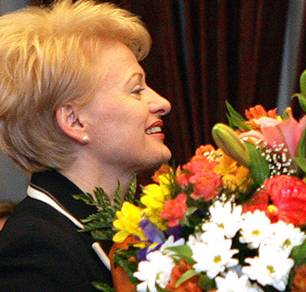
President Dalia Grybauskaitė
8th of March is International Women's Day, a day marked by women groups around the world. The day is rooted in the centuries-old struggle of women to participate in society on an equal footing with men. The idea of an International Women's Day first arose at the very beginning of the 1900s.
But in Lithuania the 8th of March is not at all characterized by women's struggle for emancipation and equality, or any sort of fighting against violence and abuse. Believe it or not, but here you will experience no single parade, no placates with demanding lines for equal rights, or any stirring speeches from women's rights activists.
The Soviet leaders were probably very anxious that the Women's Day could turn into a demonstration against the system and the many elderly, grey haired men at the top of the Kremlin. These men's smart move was to instead make the 8th of March a feast day, something in between Mother's Day and St. Valentine’s Day.
So, even today, two decades after the Soviet collapse, the 8th of March in Lithuania is the day when women receive presents, flowers, poems, text messages and lots of kind words and wishes from their men or lovers. While the 8th of March over the rest of the world makes the important point that this is a day for equality and justice between the genders, this is in Lithuania a day of romance and sweet music – a day when people celebrate more the difference than the equality between the genders.
Wed, 7th March, 2012 - (1) Comment
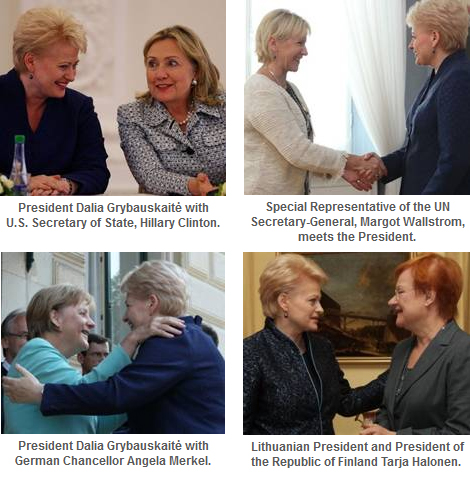
Last year Lithuanian President Dalia Grybauskaitė hosted several important meetings with ‘women issues’ on the agenda.
Leading women of the world met in the Presidential Palace on 30 June for the Conference Women Enhancing Democracy: Best Practices organized on the initiative of the Lithuanian President and President of the Republic of Finland Tarja Halonen.
On 1 July, President Grybauskaitė had meetings with U.S. Secretary of State Hillary Clinton, Kyrgyz President Roza Otunbayeva, Kosovo President Atifete Jahjaga, the EU High Representative for Foreign Affairs and Security Policy Catherine Ashton, and Special Representative of the UN Secretary-General on Sexual Violence in Conflict Margot Wallstrom.
Wed, 7th March, 2012 - (3) Comment
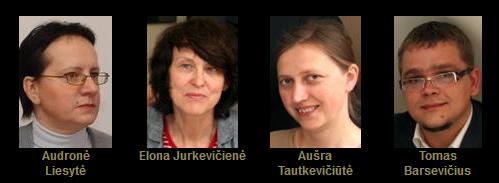
The Klaipeda Municipality tem planning the new crisis centre for women:
· Ms. Audronė Liesytė, Head of Social Care Division
· Ms. Elona Jurkevičienė, Head of Project Division
· Ms. Aušra Tautkevičiūtė, Chief Specialist of Construction and Infrastructure Development Division
· Mr. Tomas Barsevičius, Chief Specialist of Project Management Subdivision, Project Division
One of the biggest problems that Lithuania faces today is violence against women. Statistics claims that 63% of all women in Lithuania suffered from physical and/or psychological violence, whereas world average is 33%.
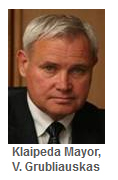 Klaipėda becomes a pioneer in this social blind spot
Klaipėda becomes a pioneer in this social blind spot
In an interview with Klaipeda’s Mayor Vytautas Grubliauskas last year, I asked him if he thought Klaipeda could be a good example for other Lithuanian municipalities with regards to this very severe problem.
The mayor answered:
“Thanks to funds from Espersen Foundation, Klaipėda becomes a pioneer in this social blind spot. What we will see with rise of this building, however, is not a problem solution, only a shelter for severe societal problems. Although the shelter is extremely needed, Klaipėda will never be an example if violence will persist. Therefore I see immediate need for social evolution towards extermination of violence against women in general. For that we need awareness campaigns and education from early school age. Only with such package of measures I will be able to call Klaipėda as good example for other municipalities.”
Lithuania's port city has for years had a women's shelter for women, but has now taken a huge step forward and is already well underway with the planning of what is probably going to be Lithuania's most modern and advanced crisis centre for women. The new centre is expected ready summer 2012.
Sat, 18th February, 2012 - (0) Comment
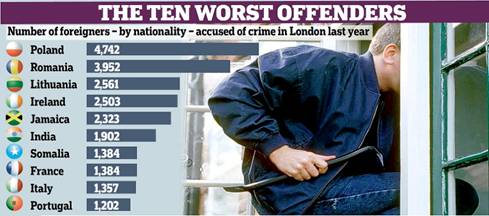
Illustration: http://www.dailymail.co.uk
Eastern European criminals were responsible for more than 11,000 crimes in London last year. Nationals of Poland, Romania and Lithuania were most likely of all foreigners to be prosecuted by the police, an investigation has revealed, according to Mail Online.
Overall, foreigners are accused of one in four of all crimes committed in London.
Astonishingly, they make up nine out of ten drug suspects and are responsible for more than one in three sex offences.
One in four of the East European assailants were Lithuanians, while criminals from Poland
accounted for around 50%. But the percentage in proportion to population shows that Lithuania towers on top with a huge margin. In relation to population there were committed 6.5 times more crimes by Lithuanians than by Poles!
Terrible statistics for a small country that so desperately needs good forces in the recovery and new prosperity after all the years of Soviet oppression.
A report published by Associate Professor Aurelijus Gutauskas at Mykolas Romeris University's Law Faculty gives a very interesting insight into how the economic downturn has led to increased social disparities, crime, fraud and widespread shadow economy in Lithuania, ref https://vilnews.com/?p=6312#idc-container
EU homicide rate per 100 000 population,
average per year, 2007-2009

Homicide is a type of violent crime, and is defined as the intentional killing of a person, including murder, manslaughter, euthanasia and infanticide. It excludes death by dangerous driving, abortion and help with suicide. The national figures indicatethat Lithuania and Estonia have by far the highest incidence of homicides (over 8 and 5 victims respectively per 100 000 population).
Wed, 15th February, 2012 - (2) Comment
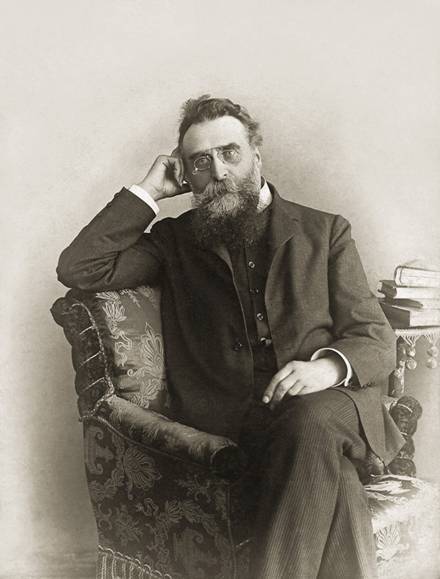
Jonas Basanavičius (23 November 1851 – 16 February 1927) was an activist and proponent of Lithuania's National Revival and founder of the first Lithuanian language newspaper Aušra. He was a signatory of the Act of Independence of Lithuania on 16 February 1918 Basanavičius is often given the unique informal honorific title of the "Patriarch of the Nation" for his contributions and help in re-establishing the Lithuanian state.
By Aage Myhre, Editor-in-Chief
aage.myhre@VilNews.com
“A man's country is not a certain area of land, of
mountains, rivers, and woods, but it is a principle;
and patriotism is loyalty to that principle.”
- George William Curtis
It is 16 February 2012. It is today exactly 94 years since a group of brave men wrote the Lithuanian declaration of independence after the country had been under Tsarist Russia's iron heel through more than 100 years. These men represented a generation that certainly felt an overwhelming sense of pride at the dawn of renewed independence. The Act of February 16 was signed by all 20 representatives of the Council of Lithuania, proclaiming the restoration of an independent State of Lithuania, governed by democratic principles. The meeting and signing procedures were chaired by Jonas Basanavičius, the man often given the unique informal honorific title of the "Patriarch of the Nation" for his contributions and help in re-establishing the Lithuanian state.
What these men presented from the balcony of a house in Pilies street here in Vilnius Old Town was not much more than a piece of paper. But it was a paper that symbolized a nation willing to throw off the yoke. A nation that had won back its self respect and dignity in spite of the injustice and oppression that had been going on since the Russian occupation started in 1795.
We salute these men for their courage and foresight. We salute them because they, in faith, hope and dignity clearly showed that Lithuania wanted to live up to its proud history as a nation of greatness.
Great nations are founded on self-belief!
Sun, 12th February, 2012 - (0) Comment

Text: Aage Myhre
A reader who responded to one of our VilNews issues last year argued that our publication had begun to go in the footsteps of local Lithuanian media in describing Lithuania in a rather negative way. I can well understand such a reaction, but it must also be said that unfortunately there has been a relatively large number of cases and circumstances in this country that deserve to be described in quite critical terms.
The bad
• The Lithuanian people, especially the weakest groups, are very hard hit by the economic crisis that continues to affect much of the world. The country's pensioners and other disadvantaged groups continue to live under very miserable conditions, and one must be allowed to make critical remarks on how this country's authorities have acted in the handling of the crisis. It seems to me that Lithuania's government has been more concerned with finding their own solutions, trying to ‘reinvent the wheel' rather than to learn from what other nations have made with regard to stimulus packages, lowered interest rates, etc. in these times of crisis, which in my view unnecessarily sets Lithuania several years back in time compared to many other countries. Fortunately, it appears that the immediate panic that came to characterize both the government and the banks in 2008-2010, was slowly taken over by more mature attitudes in 2011.
• There has still been far too little done for increased foreign investments in Lithuania, even if there were some good efforts made during 2010 and 2011. Also the country's own industry has largely had to fend for themselves without the kind of facilitation and support one sees taking place in countries frequently compared with Lithuania.
Fri, 10th February, 2012 - (2) Comment
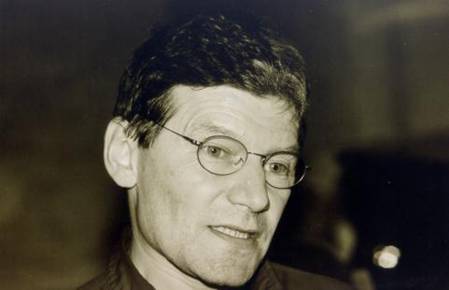
Markas Zingeris
Photo: Džojos Barysaitės
“Neo-Nazis are selling themselves as patriots to the mass-audience; they misuse the term patriotism, plant ersatz values and spread seeds of hate.”
Markas Zingeris interviewed by Diana Koval
Markas Zingeris - a well-known writer, poet, journalist and director of the Vilna Gaon Jewish State museum, in an interview by Vilnews, shared his thoughts on intolerance and anti-Semitism issues in today’s Lithuania.
Q. Anti-Semitic displays in modern-day Lithuania happen quite often. For example, last month someone hoisted up swastika flags on Tauro hill in Vilnius and hung a poster with anti-Semitic slogans near the Kaunas Jewish synagogue. Why do you think such events are happening now? Another question - whether the public or the government is too indifferent to such a phenomenon? The investigation of Petras Stankeras case was terminated due to lack of evidence. Doesn’t it show public aloofness?
M. Z. It shows the lack of determination among the lawyers, or lack of consensus on some really central issues. Personally, I think it is the serious gap in humanitarian education among members of the judiciary, politicians, journalists and the lack of in-depth understanding of history of the twentieth century. In general, it is the absence of common accepted views about the past in a society stuck in the crossroads between East and West, Past and the Future.
Sun, 29th January, 2012 - (1) Comment

Illustration from: http://www.cafepress.com
Text: Aage Myhre
aage.myhre@VilNews.com
I've been asked why VilNews puts relatively much emphasis on articles with historical content. I've also been asked whether our journey around Europe in January should be presented in a publication that otherwise focuses on Lithuania.
My response is as follows:
Sooner or later the history knocks
at the door of the present
Lithuania’s Foreign Minister Audronius Ažubalis recently said this about the still latent conflict between Armenia and Turkey on the mass killing that took place during the First World War. He is of course right, and the statement is valid for us all, also Lithuania.
The Lithuanian people have for 200 years largely been deprived of the opportunity to know their own nation's history presented in an objective and outspoken way. Those who published historical documentation here were often people who deliberately swept some parts of Lithuania's history under the carpet, exaggerated on other aspects and deliberately misinformed the people. During the years when Lithuania was under Tsarist Russia, Nazi Germany and the Soviet Union, truth and authentic information was often forbidden or falsified. Today it is no longer so, but I still feel that the knowledge about own history among the people here is not very deep or comprehensive in many cases.
Lithuania is a country that more than many others should be seen and understood in the light of historical perspectives...
VilNews e-magazine is published in Vilnius, Lithuania. Editor-in-Chief: Mr. Aage Myhre. Inquires to the editors: editor@VilNews.com.
Code of Ethics: See Section 2 – about VilNews. VilNews is not responsible for content on external links/web pages.
HOW TO ADVERTISE IN VILNEWS.
All content is copyrighted © 2011. UAB ‘VilNews’.